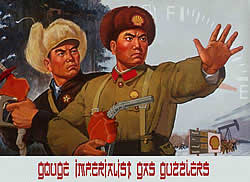Hogging the Picture
Submitted by Sheldon Rampton on
The Harley-Davidson motorcycle company has arranged a deal with the film school at the University of California-Santa Barbara that recruits students as cheap labor to make Harley ads in the form of "short sponsored videos for online media or for downloading to other digital media platforms such as cell phones, iPods, and PDAs." Under the terms of the "partnership," students submit proposals to Harley-Davidson, describing the type of video they plan to make. If approved, the company pays a stipend of up to $1,200 for each proposal, and a prize of $5,000 to the winner.


 If you think the U.S.
If you think the U.S. 

 In their groundbreaking 1988 book, Manufacturing Consent, professors Ed Herman and Noam Chomsky not only explained, but documented with extensive case studies, how mass media and public opinion are shaped in a democracy. Twenty years later, can their "propaganda model" still be used to explain modern media distortions? That was one of the main questions discussed last week at a conference in Windsor, Ontario, titled "
In their groundbreaking 1988 book, Manufacturing Consent, professors Ed Herman and Noam Chomsky not only explained, but documented with extensive case studies, how mass media and public opinion are shaped in a democracy. Twenty years later, can their "propaganda model" still be used to explain modern media distortions? That was one of the main questions discussed last week at a conference in Windsor, Ontario, titled "